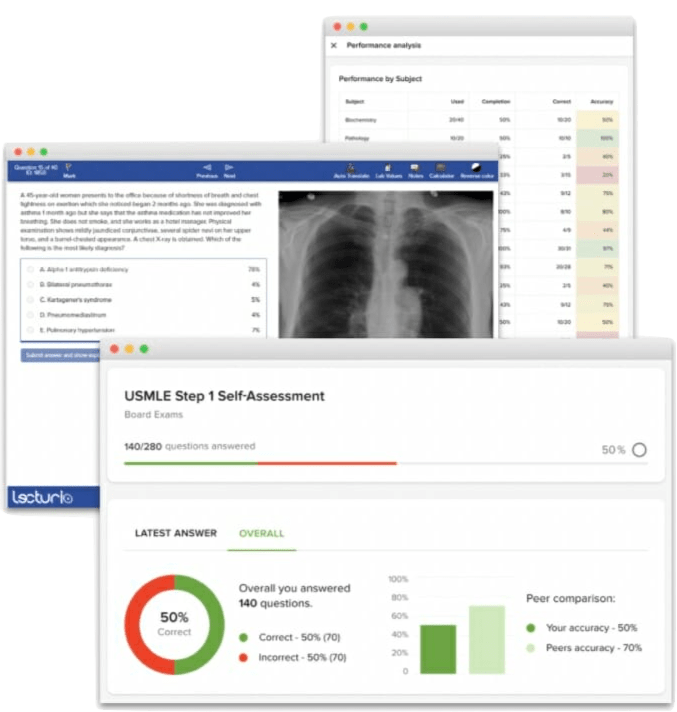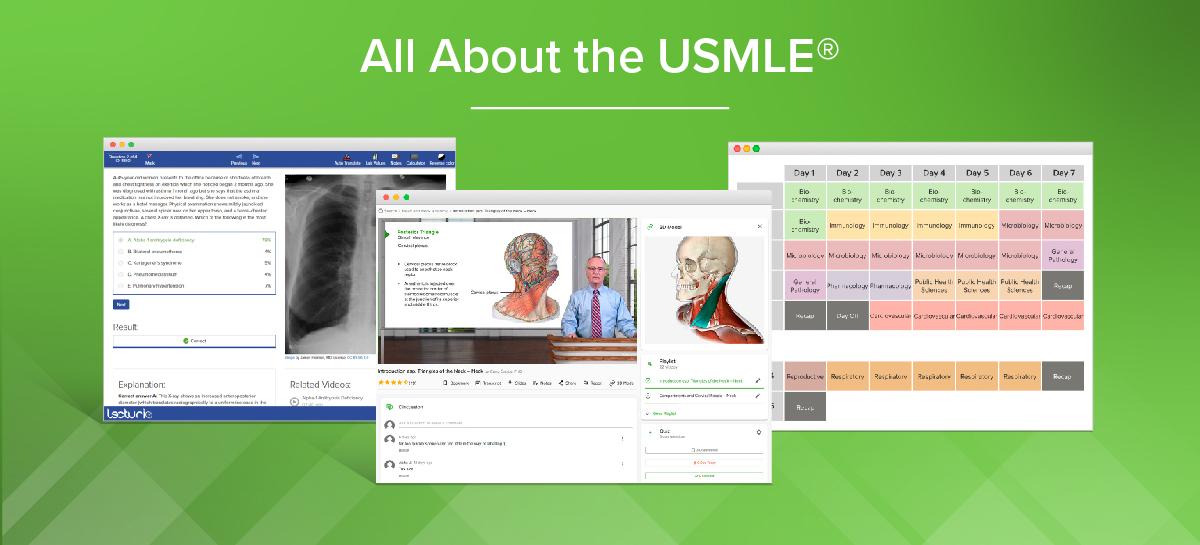Eligibility for USMLE® Step 3
To be eligible to take USMLE® Step 3, you must have already taken and passed Step 1, Step 2 CK, and meet other eligibility requirements, including your continued ability to complete all steps of the USMLE® exam within seven years.
Additionally, you can only apply to take Step 3 after the date of graduation listed on your medical school diploma.
For more specific application information, visit the FSMB’s website.
When Do You Take USMLE® Step 3?
USMLE® Step 3 is required for licensure in the United States.
It is recommended that you take Step 3 after completing (or when you are close to completing) at least one year of postgraduate training at a US-accredited graduate medical program.
Many residents in surgical specialties (general surgery, ophthalmology, or otolaryngology, for instance) choose to take Step 3 soon after completing medical school while the information on the specialties is still fresh in their mind. For other specialties that are very general in scope, such as internal medicine or family medicine, examinees often wait until sometime during their second or even third year of residency. Keep in mind that Step 3 tests aspects of general medicine, surgery, pediatrics, and OB/GYN and plan accordingly, so that the information is fresh in your mind. Regardless of when you take the exam, you will need a passing score to apply for licensure after you complete your residency.
USMLE® Step 3 Registration
Similar to Step 1 and Step 2, when you apply for Step 3, you will need to select a 3-month eligibility period and schedule an appointment at any Prometric test center in the United States or its territories.
Unlike Steps 1 and 2, the USMLE® Step 3 is a two-day exam. The exam can be scheduled either on two consecutive or on two non-consecutive days. You must complete Step 3 Day 1 before taking Step 3 Day 2.
What is the USMLE® Step 3 pass rate?
As of 2020, the most recent year for which data is available, the pass rate for examinees from US/Canadian medical schools was 98%. For examinees from non-US/Canada medical schools, the pass rate was slightly lower, at 89%.
What is a passing score for USMLE® Step 3?
The current minimum passing score for USMLE® Step 3 is 198. (Last updated April 2022)
How is USMLE® Step 3 scored?
The USMLE® Step 3 exam is reported on a 3-digit scale. The current minimum passing score for Step 3 is 198.
When and how will I receive my Step 3 scores?
USMLE® Step 3 scores are available from the Step 3 candidate website about four weeks after your exam takes place. As with the other Steps, scores are released on Wednesdays (you will be notified via email). Your Step 3 score report will remain available for 365 days, after which your scores will only be available via official USMLE® transcript and for a fee.
Why might my scores be delayed?
There are a number of reasons why your scores can be delayed. Several quality assurance steps are followed to ensure that the processing and scoring of your examination are secure. In addition, significant test changes or any irregular behavior or other issues at your test site can lead to delays. Any announcements of widespread delays will be posted on the USMLE®’s website.
What happens if I fail Step 3?
If you fail Step 3, you can retake the exam after re-applying, as long as you still meet all the eligibility requirements. As with the other Steps, you may take Step 3 up to four times in total, as long as you still meet the eligibility requirements.
Please note: step attempt limits were decreased from six to four in 2021.
What is the cost of USMLE® Step 3?
The current registration cost for USMLE® Step 3 is $895.
How to Study for USMLE® Step 3
Much like the USMLE® Step 1 and 2 exams, success on USMLE® lies in careful preparation prior to test day. If you’re familiar with the previous exams, the importance of developing a study plan and using a trusted, high-quality question bank are probably already evident to you. However, there are a few important differences between USMLE® Step 3 and the first two exams, starting with the format of the test.
What is the format of USMLE® Step 3?
Unlike USMLE® Step 1 and 2, USMLE® Step 3 is a two-day exam, comprised of two parts: Foundations of Independent Practice, in the traditional multiple choice block format and Advanced Clinical Medicine, which incorporates clinical case scenarios using a unique testing interface not seen in the previous two step exams. For this reason, it’s important to familiarize yourself with the testing interface for case scenarios before test day.
Day 1
The first day of the USMLE® Step 3 exam, also called Foundations of Independent Practices (FIP), focuses on testing your knowledge of basic medical and scientific principles. This testing session includes six 60-minute blocks of 38-39 multiple choice questions, similar in style to the Step 1 and Step 2 CK. The first day takes about 7 hours, including 45 minutes of break time and an optional 5-minute tutorial.
Day 2
The second day of the USMLE® Step 3 exam, also called Advanced Clinical Medicine (ACM), focuses on your ability to apply comprehensive health and disease knowledge to patient management and the evolution of diseases over time. This testing session includes six 45-minute blocks of 30 questions, and 13 case simulations, for which 10 or 20 minutes each are allotted. There is a 5-minute optional tutorial for the multiple choice section, a 7-minute clinical case simulation tutorial, and 45 minutes of break time.
What topics are on the USMLE® Step 3?
The USMLE® Step 3 exam tests your medical knowledge and ability to apply it in patient-centered contexts. In addition to your medical and basic science foundations, your communication and professionalism will also be tested as part of this two-day examination.
Step 3 MCQ Test Content Specifications*
| System | Range, %* |
| General Principles of Foundational Science** | 1–3 |
| Immune System, Blood & Lymphoreticular System, and Multisystem Processes/Disorders | 6–8 |
| Behavioral Health | 4–6 |
| Nervous System & Special Senses | 8–10 |
| Skin & Subcutaneous Tissue | 4–6 |
| Musculoskeletal System | 5–7 |
| Cardiovascular System | 9–11 |
| Respiratory System | 8–10 |
| Gastrointestinal System | 6–8 |
| Renal/Urinary & Male Reproductive Systems | 4–6 |
| Pregnancy/Childbirth & Female Reproductive System & Breast | 7–9 |
| Endocrine System | 5–7 |
| Biostatistics & Epidemiology/Population Health & Interpretation of Medical Literature | 11–13 |
| Social Sciences: Communication Skills/Ethics/Patient Safety | 7–9 |
* Percentages are subject to change at any time.
** The general principles category for the Step 3 MCQ examination includes test items concerning normal processes not limited to specific organ systems. These test items are typically related to normal development. Categories for individual organ systems include test items on those normal and abnormal processes that are system-specific.
Step 3 CCS Test Content Specifications
● General Principles of Foundational Science
● Immune System*
● Blood & Lymphoreticular System*
● Behavioral Health*
● Nervous System & Special Senses*
● Skin & Subcutaneous Tissue*
● Musculoskeletal System*
● Cardiovascular System*
● Respiratory System*
● Gastrointestinal System*
● Renal & Urinary System*
● Pregnancy, Childbirth, & the Puerperium*
● Female Reproductive & Breast*
● Male Reproductive*
● Endocrine System*
● Multisystem Processes & Disorders*
● Biostatistics & Epidemiology/Population Health, & Interpretation of the Medical Literature
● Social Sciences
*Marked categories are covered in CSS cases
Click here to see the USMLE’s test specifications for Step 3.
As always, when it comes to the USMLE® Step exams, developing a study plan to guide your preparation and using a high-quality question bank to familiarize yourself with the questions you’ll face on exam day is the key to success. Prepare yourself by reviewing the USMLE®’s content guide, and pair this with question-based learning to give yourself the best chance of passing on exam day.





